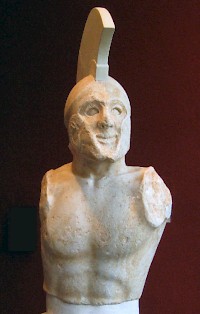Cleomenes I
Accession

Cleomenes was the son of the Agiad king Anaxandridas of Sparta (r.c.560-c.520 BCE) and his second wife. Writing a century later, the Greek researcher Herodotus of Halicarnassus would write that Anaxandridas had had two wives, and that Anaxandridas’ first wife had given birth to a child almost at the same time, Dorieus.note This story may have been invented to cast doubt on the legitimacy of Cleomenes’ reign. Anaxandridas’ third and fourth sons (and Cleomenes’ second and third half-brothers) were Leonidas and Cleombrotus, who may have been twins.note
Whatever the later stories, and whatever Herodotus’ judgment that Cleomenes was king not because of his qualities but because monarchy happens to be hereditary,note Cleomenes succeeded his father in c.520 BCE. According to the same source, Dorieus objected and left Sparta to establish a colony in Libya near the river Cinyps (close to Lepcis Magna).note When this project failed, he left for Sicily, where he founded Heraclea Minoa and was killed in action.note After this, there was no opposition from Cleomenes’ family left.
Avoiding Overstretch
Although a powerful state, Sparta was in the periphery of the Greek world, far away from the main religious centers (Olympia, Eleusis, and Delphi) and far from the other important Greek cities (Argos, Corinth, Athens, Miletus, and Thebes). Usually, the horizon of Spartan rulers was not much wider than the Peloponnese. Cleomenes is unique in that he understood that the world was larger, which meant that he would interfere beyond the peninsula, while he also understood that Sparta was to avoid overstretch.
This can be illustrated by an incident that has been recorded by Herodotus. He tells that the people of Plataea, a town in Boeotia, were under pressure from nearby Thebes, and were looking for help. As it happened, Cleomenes was in the neighborhood – Herodotus does not tell us why – and they proposed some kind of alliance. The Spartan king refused, explaining that Sparta was too far removed from Boeotia.note
This incident is not unique. In c.516, an envoy from the isle of Samos received a similar response,note and the leader of the Ionian Revolt, Aristagoras, also learned that Sparta would not accept commitments in a country that was too far away.note Herodotus also tells about a Scythian embassy to Sparta that proposed a double attack on the Persian Empire.note Although this has not been recorded, it would seem that Cleomenes sent away the ambassadors in the usual way – at least, we are not aware of a Spartan invasion of Asia.
The Athenian War
In 514 BCE, Harmodius and Aristogeiton (the “tyrannicides”) killed Hipparchus, the brother of the tyrant of Athens, Hippias, who retaliated violently.note At this point, the Athenian aristocrat Cleisthenes, bribed the Pythian priestess of Delphi to tell the Spartans that they ought to help the Athenians liberate themselves.note
The Spartans obeyed. After a failed first operation, led by one Anchimolius,note Cleomenes personally intervened. He besieged Hippias on the Acropolis, expelled the tyrant, and handed over power to the Athenian magistrates (511/510 BCE).note Now, the aristocrats started to quarrel: on the one hand Cleisthenes, who had made possible the overthrow of the tyrant, and on the other hand Cleomenes' friend Isagoras, who secured his election for the archonship in 508/507.
To counter Isagoras' seizure of power, Cleisthenes introduced reforms, which gave power to the demos, the people's assembly. The establishment of democracy was too much for Isagoras, who asked for another intervention by Cleomenes.note Indeed, the Spartan king expelled Cleisthenes and his adherents,note but he met with great resistance and found himself besieged on the Athenian Acropolis. In the end, the Spartan army was allowed to leave, while Isagoras and his followers were executed.note
There are indications of a third Spartan expedition to Attica, but it seems to have ended near Eleusis, where Cleomenes and his colleague, the Eurypontid king Demaratus, seem to have quarelled about the burning of a sacred forest.note The details are obscure, but in any case, the Spartans had been able to overthrow the tyranny in the largest city of Greece. No one would deny that Sparta was the most powerful city in Greece.
War against Argos
Some ten years later, in about 495 BCE, war broke out with Argos, Sparta’s main rival on the Peloponnese. Half a century before, the Spartans had already conquered the eastern part of the peninsula, the fertile plain of Thyrea, in the legendary “battle of the champions”.note Now, Cleomenes used Thyrea as a rendez-vous for ships from his naval ally Sicyon, to which he added ships that he seized from the Aeginetes.note From here, he crossed to the port of Nauplia, where the Argives had not expected an attack.note
In the battle of Hesipaea, near Tiryns, Cleomenes defeated his opponents, massacred them, and even sacrificed in Argos’ temple of Hera.note According to Herodotus, Argos had lost 6,000 men;note this may be exaggerated, but the city ("widowed of men", according to Herodotus) witnessed a civil war between the old oligarchs and the populace,note and would remain remarkably passive for the next decades. Argos would never recover.
Although Cleomenes had made Sparta into the unrivaled leader of the Peloponnese, the ephors (the representatives of the Spartan people) complained that he had not captured Argos itself. Cleomenes argued that he had received bad omens, whic his accusers found credible.note Another explanation may be that Cleomenes, who had experience with urban warfare in Athens, realized that he would never be able to take Argos.
War with Aegina
In these years, the Persians were restoring order in Asia Minor, where the Ionian Greeks had revolted. In 494, the Persians captured Miletus, the center of the insurrection. Two years later, a Persian army reached Macedonia, and it was obvious that Greece would be the next target. King Darius sent heralds to ask "earth and water", i.e., signs of submission. Among those who surrendered were the Aeginetans.note

When the Athenians had told him about this, Cleomenes launched a pre-emptive strike towards the unreliable island, but the Aeginetans reminded him that he was exceeding his mandate.note They had been informed about this by the other Spartan king, Demaratus, with whom Cleomenes had fallen out after the crisis in Eleusis mentioned above.
The royal quarrel does not last long. Cleomenes spreads the rumor that Demaratus is an illegal child, bribes the oracle at Delphi to confirm the accusation, and ensures that his colleague goes into exile.note Demaratus is succeeded by a strawman, Leotychides. The two kings invade Aegina, where they arrest the leaders of the pro-Persian party and send them to a prison in Athens.
Not much later, in 490, the Spartans were allied with Athens in the war against the Persian invader, but they arrived too late for the battle of Marathon. Herodotus, our main source, has not recorded the name of the Spartan commander. It may have been Cleomenes, Leotychides, or someone else.
Demise and Death
When Cleomenes’ machinations at Delphi became known, he was forced to leave Sparta. However, by threatening to start a guerilla war in Arcadia, he brought about his return,note but he started to act strangely, and his family was forced to place the madman in the stocks. In prison, Cleomenes obtained a knife and started to mutilate himself until he died.note It has been suggested that he was in fact murdered.
Cleomenes was succeeded by his halfbrother Leonidas, who had married Cleomenes’ daughter Gorgo.
Herodotus suggests that the madness of the king was a divine punishment for sacrilege.note Another ancient interpretation of Cleomenes’ excessive behavior, also mentioned by Herodotus, was that he drank strong wine.note He may well be repeating later stories, told by people who detested a king of Sparta whose horizon was wider than usual.